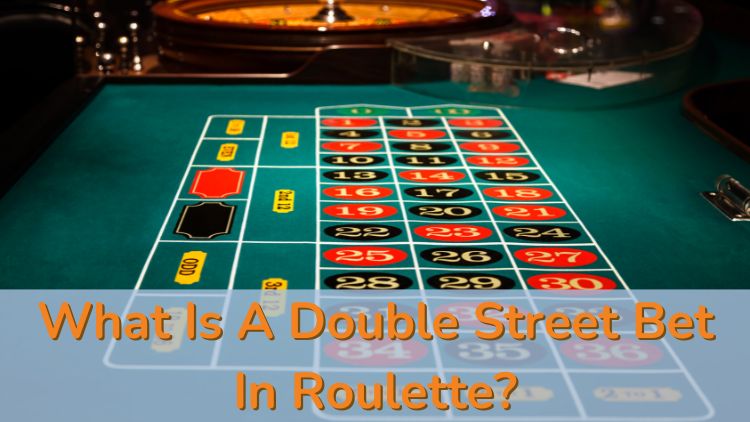
Roulette is a popular casino game with many betting options. One of these options is the double street bet, which can be exciting and potentially rewarding.
In simple terms, a double street bet allows you to place your wager on six numbers at once. This kind of bet covers two neighbouring rows of three numbers each. It's different from other bets because it gives you more chances to win compared to placing a bet on a single number or other inside bets covering fewer numbers, but it also offers better payouts than the outside bets.
Understanding how it works and its potential payouts can add another viable betting option to your game. In this post, we'll explain what a double street bet is and how to place one, as well as go through some roulette strategies players may choose to use.
What Is A Double Street Bet In Roulette?
A double street bet, also known as a line bet, is a type of wager in roulette where you place your chips on two adjacent rows of three numbers. This way, your bet covers a total of six different numbers on the roulette table.
To place a double street bet, you'll need to position your chips on the outside line where the two rows meet. For example, if you want to bet on the numbers 4, 5, 6, 7, 8, and 9, you'll place your chips on the outside line of numbers 6 and 9 on the corner they meet at.
The benefit of a double street bet is that it doesn't limit you to just one number. By covering six numbers, you increase your chances of a win compared to single-number bets, as there are 6 pockets the ball could land in, and your bet wins. However, keep in mind that the payout for a double street bet is lower than a straight bet on a single number.
In roulette, the payout ratio for a double street bet is 5:1. This means if you bet £1 and win, you'll receive £5 in winnings plus your original £1 back. Understanding this bet type can make the game more engaging and offer a balanced risk-to-reward ratio.
How Much Does A Double Street Pay In Roulette?
The double street bet in roulette offers a straightforward payout structure. If your bet is successful, the payout ratio is 5:1.
This means that for every £1 you bet, you'll win £5 in addition to getting your original stake back, so here you would receive £6 in total.
For example, if you place a £2 double street bet and the ball lands on one of your chosen numbers, you would win £10, plus you'll get your initial £2 returned, making it £12 in total.
While the payout is lower compared to betting on a single number, your chances of winning are higher because you're covering six numbers instead of just one. This balance between risk and reward makes the double street bet an appealing choice for many players.
By understanding the payout structure, you can make better informed and more confident decisions at the roulette table, which could lead to you enjoying the experience more. Always remember to gamble responsibly and within your limits first and foremost.
What Is The Most Successful Roulette Strategy?
There's no guaranteed way to win at roulette, as it's a game of chance. However, various strategies can help you manage your bets and provide some structure, which may potentially improve the experience for some players.
One popular strategy is the Martingale system. This involves doubling your bet after every loss, aiming to recover all previous losses upon a win. If you win, you then return to the starting bet amount and repeat the process. While it can be exciting, it also carries a high risk because winning is never guaranteed, and the bet amounts can reach high amounts quickly if you hit a losing streak.
Another strategy is the Fibonacci system, where you follow a sequence of numbers to place your bets. You start with a small bet and increase it according to the Fibonacci sequence (1, 1, 2, 3, 5, 8, etc.) - i.e. the next bet amount is the sum of the previous two. If you lose, you move to the next number in the sequence. If you win, you go back two steps in the sequence. This approach is less aggressive than the Martingale system but still involves risk, as bet amounts can still increase quickly.
The D'Alembert strategy is another option, where you increase your bet by one unit after a loss and decrease it by one unit after a win. This method aims to balance wins and losses over time by focusing on the even-money outside bets that have just under a 50% chance of success and utilising a betting pattern that follows the theoretical ebb and flow of these outcomes.
While these strategies can make playing more structured, always remember that no system can overcome the house edge. In fact, strategies like these do not affect the inherent odds of the game of roulette in any way. The best approach is to appreciate the randomness and unpredictability of the game, stick to a budget, and play responsibly.
*All values (Bet Levels, Maximum Wins, etc.) mentioned in relation to this game are subject to change at any time. Game features mentioned may not be available in some jurisdictions.
